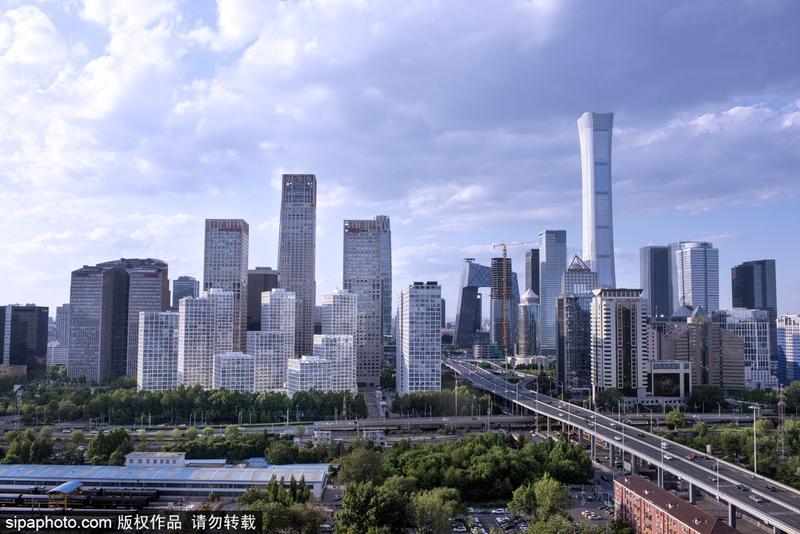 A photo shows the sunny day view of CBD area in downtown Beijing. (PHOTO PROVIDED TO CHINA DAILY)
A photo shows the sunny day view of CBD area in downtown Beijing. (PHOTO PROVIDED TO CHINA DAILY)
Beijing's government aims to increase the city's GDP by 6 percent this year in a green way and make the digital sector a new driving force, Mayor Chen Jining said while delivering the government work report on Saturday.
The report also said that per capita GDP is expected to reach 210,000 yuan (US$32,400) in 2025 when China's 14th Five-Year Plan period concludes, up from about US$24,000 last year.
In the next five years, the capital aims to keep the urban surveyed unemployment rate under 5 percent and optimize its income distribution structure so that the middle-income group continues to expand, the report added.
In the report, the municipal government said it plans to develop the digital sector and cutting-edge technologies including artificial intelligence, quantum technology, integrated circuits, new materials and life sciences into a new engine of economic growth.
ALSO READ: Beijing realty en-block deals near high
By last year, the number of national high-tech enterprises in Beijing had reached 29,000, of which 93 were unicorns, or startup companies valued at over US$1 billion.
Beijing's digital economy will play a leading role in boosting the service industry, finance and high-tech industries such as information technology, healthcare and intelligent manufacturing.
Chen Jining, mayor of Beijing
"Beijing's digital economy will play a leading role in boosting the service industry, finance and high-tech industries such as information technology, healthcare and intelligent manufacturing," Chen said.
Last year, the digital economy accounted for 38 percent of the city's GDP, and the added value of its high-tech industry increased by 57 percent over the last five years, the report said.
READ MORE: China’s digital economy is powering economic growth, experts say
In September, the State Council announced the establishment of a free-trade zone in Beijing and approved the capital's application to build a national comprehensive demonstration zone for expanding opening-up in the services sector.
In the government report, Chen said the government will carry on with construction of the two zones to promote the city's opening up.
The zones will focus more on the digital economy and service industry, taking advantage of science and technology development and an international business climate.
"We will accelerate the formation of an investment and trade service system in line with international standards while launching an international information industry and digital trading port for cross-border data flow," he said.
In December, the city's Xicheng district government released a guideline on developing its digital economy, saying the district will introduce or cultivate more than 50 competent enterprises in the digital sector by 2023. It will also promote the integration of economic entities and e-commerce.
"Xicheng will increase financial support and provide better services in the digital economy to develop more enterprises, carry out more key projects and cultivate talent," the guideline said.
Haidian district, where Zhongguancun science park is based, announced this month that its government will support foreign scientists' efforts to take the lead in government-funded science and technology projects. It will improve security services for scientific research institutions to access international academic websites.
The work report said Beijing will achieve its economic growth in a green way by improving its energy and resource utilization efficiency and reducing pollutants.
Energy and water consumption per unit of GDP will decline continuously in the next five years, with total water consumption kept within 3 billion cubic meters.
"For the next five-year plan, the government needs to promote a green lifestyle to reduce carbon emissions and pollutant discharges," Chen said. "For example, garbage sorting will be a conscious action among all citizens."
Over the past five years, airborne levels of PM2.5, fine particulate matter with a diameter of less than 2.5 micrometers, decreased by 53 percent, the report said.
A draft guideline for the next five-year plan for Beijing released on Sunday said the capital will replace government and public transport vehicles that are powered by gasoline, including buses, sanitation trucks, taxis, postal vehicles, vans and official cars, with new energy vehicles and gradually ban diesel cars from its Dongcheng and Xicheng districts.
Beijing will soon clarify a timeline for the city's path to carbon neutrality, a balance between carbon emissions and absorption.
"Through the efforts, the government shows it is dedicated to developing Beijing into an international innovative center featuring technology and green development," Chen said.
Contact the writer at lihongyang@chinadaily.com.cn


